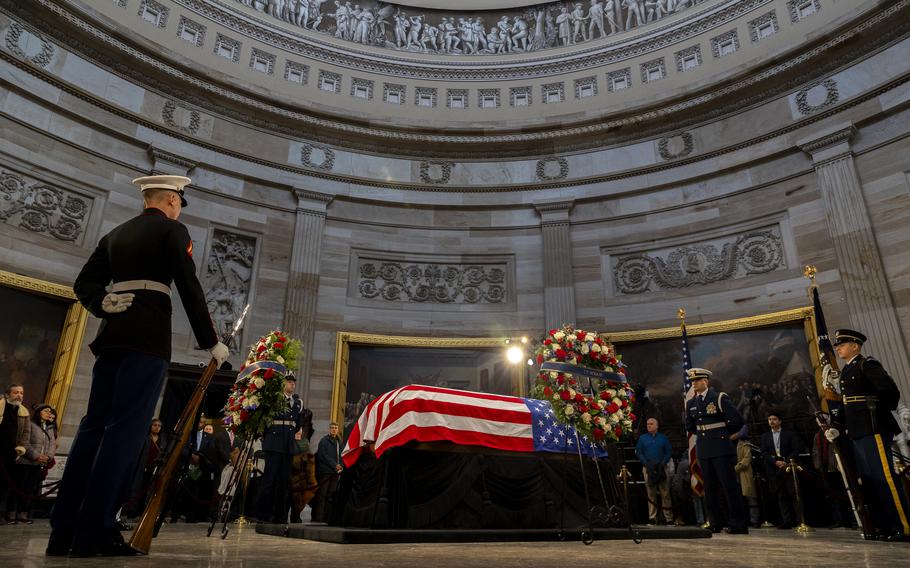
Former President Jimmy Carter lies in state Wednesday, Jan. 8, 2025, in the Capitol Rotunda in Washington. (Eric Kayne/Stars and Stripes)
WASHINGTON — Thousands of people braved cold temperatures and the aftermath of a snowstorm Wednesday to honor and pay their respects to former President Jimmy Carter as he lay in state in the U.S. Capitol.
The line of mourners stretched beyond the Capitol to the outdoors and included Richard Shullaw, a 78-year-old Army National Guard veteran, who has made a habit of bidding goodbye to the nation’s leaders at the Capitol.
He went to see Sen. John McCain, President George H.W. Bush and President Gerald Ford when they lay in state, and he was not about to miss the sendoff to Carter.
“It’s very moving, it’s very impressive,” he said of the display at the Rotunda.
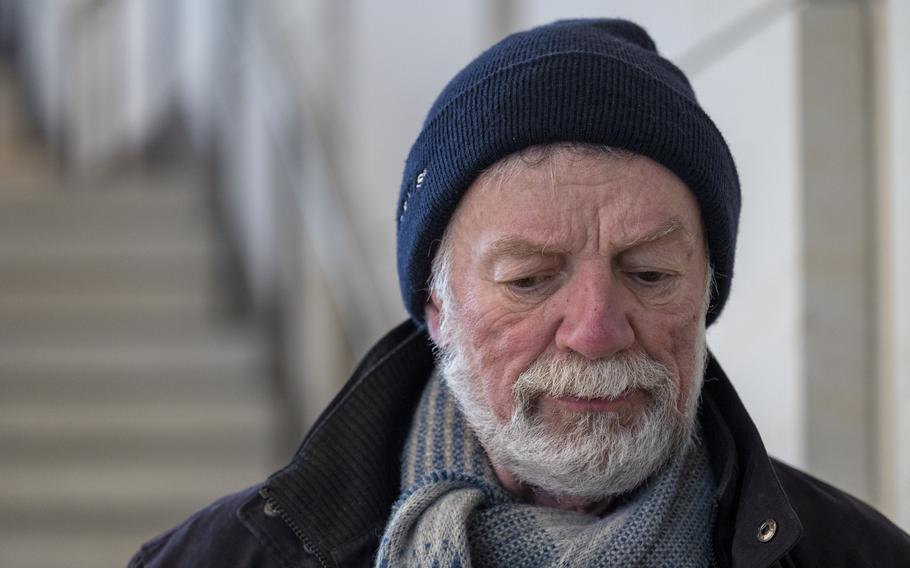
Richard Shullaw, a 78-year-old Army National Guard veteran, was in Washington on Wednesday, Jan. 8, 2025, to view the casket of former President Jimmy Carter, lying in state in the Capitol Rotunda. (Eric Kayne/Stars and Stripes)
Shullaw of Alexandria, Va., vividly remembers Carter and his wife, Rosalynn, breaking with tradition in 1977 by exiting their motorcade car and walking the path of the Inaugural Parade on foot. It left a lasting impression on him.
“He was an honest and honorable man,” he said. “It was really neat seeing him walking down Pennsylvania Avenue.”
Carter, who served as president from 1977 to 1981, died last week at age 100 and was delivered to the Capitol by a horse-drawn caisson after a ceremony at the U.S. Navy Memorial on Tuesday recognized his service as a naval officer and submariner.
The public began filing into the Capitol Rotunda on Tuesday night to view Carter’s flag-draped casket as it lay upon the same catafalque that supported President Abraham Lincoln after his assassination in 1865.
The Borcina family drove an hour from Fredericksburg, Va., to honor Carter’s life of service.
Mark Borcina, 43, is a senior master sergeant in the Air Force, and his wife, Christina Borcina, 43, is the daughter of an Air Force veteran who had met Carter. They brought along their 14-year-old son, Roman.
“This is democracy in action, and I wanted him to see it and live it and have memories of this for the rest of his life,” Mark said.
Christina said she had fond feelings toward Carter because he once shook her father Michael Sambogna’s hand to thank him for getting everybody to safety after a problem with an aircraft.
The moment was captured in a photograph and a few years ago, she sent it to Carter for his signature. He happily obliged.
Viewing Carter’s casket among a crowd of other mourners was a beautiful and somber experience, she said.
Mark said it was the least the family could do for a man that lived a life of selflessness.
“As somebody who devoted his life to service and sacrifice and everything that he gave the nation, it’s a very small token of appreciation just to take the time out of our day to come here and pay our respects,” he said.
Born to an Army veteran and raised on a farm in Georgia, Carter long dreamed of going to sea. He enrolled in the U.S. Naval Academy during World War II to become a naval officer and was commissioned as an ensign.
Carter’s Navy career took him to Virginia, Hawaii, Connecticut, New York and California. He deployed in the Atlantic and Pacific fleets and later trained for submarine duty. By 1952, Carter had served aboard the submarine USS Pomfret and was involved in the Navy’s nascent nuclear submarine program.
He became the executive officer of a crew working to build the first nuclear submarine and had aims to command the second when his father died. Carter resigned from active duty in 1953 to take over his family’s peanut farm, but his mark on the service remains.
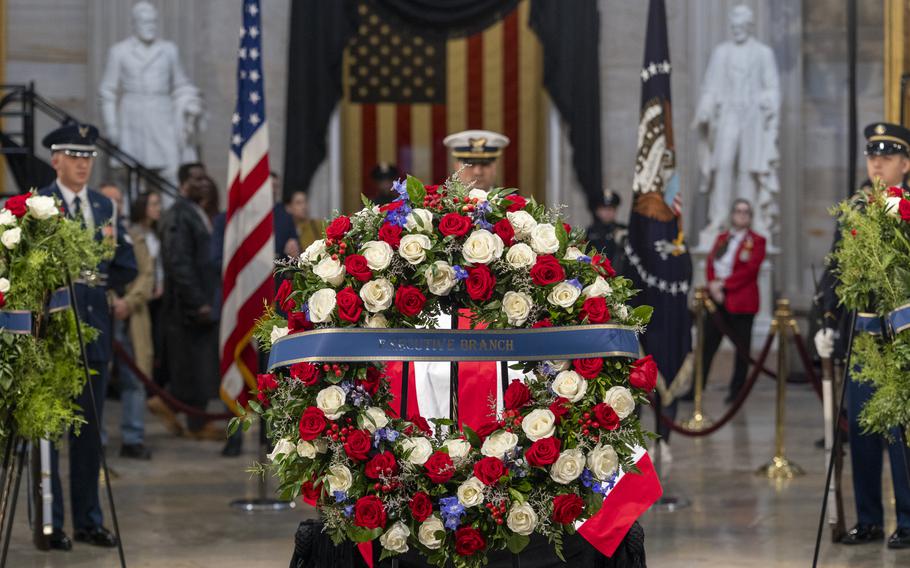
The casket of former President Jimmy Carter lies in state Wednesday, Jan. 8, 2025, in the Capitol Rotunda in Washington. (Eric Kayne/Stars and Stripes)
“It’s telling that today, the USS Jimmy Carter, a top-secret attack submarine, now roams the oceans bearing the name of the only president who served in such close quarters,” House Speaker Mike Johnson, R-La., said during a ceremony Tuesday.
The public viewing will continue into Thursday morning, after which Carter will be taken to Washington National Cathedral for a national funeral service.
Diane Westcott, 57, took the day off from work Wednesday to pay her respects. She was 10 years old when Carter was elected and said she knew even as a child that he was unlike any other politician.
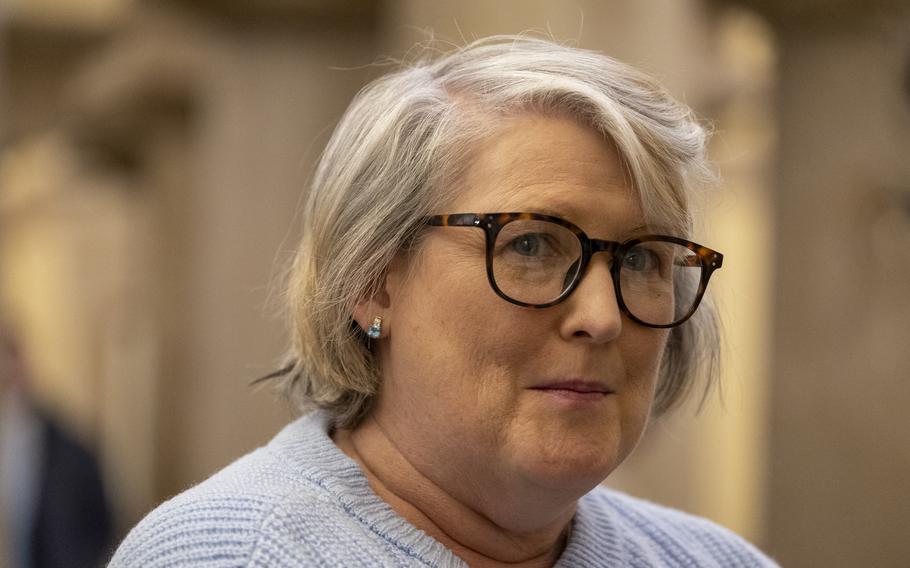
Diane Westcott on Wednesday, Jan. 8, 2025, before visiting the casket of former President Jimmy Carter, lying in state in the Capitol Rotunda in Washington. (Eric Kayne/Stars and Stripes)
“Throughout his presidency and his life, he was such a great example of what an American citizen should be: a true humanitarian, somebody who was kind, somebody who had goals beyond himself,” she said.
Westcott of Columbia, Md., nearly did not come to the viewing because of the frigid weather but decided to take advantage of a special line for family members of congressional staffers.
She was glad to have made the effort.
“It’s an experience of a lifetime to do something like this, and it’s very meaningful to me and my family,” she said.
After spending about 10 minutes reflecting in the Rotunda, Westcott signed a condolence book that will be given to the Carter family.
“A good person through and through! Take comfort in your memories of this great man!” she wrote, signing her name and the names of 10 other family members.
Faudeline Choute, 42, forwent sleep to make it to the public viewing. She worked a 12-hour shift in Baltimore beginning Tuesday night and then caught a train straight to Washington.
“I was deciding: ‘Should I come? Should I come?’ ” she said, “And then I said to myself, ‘Why not? I should come. It’s once in a lifetime.’ ”
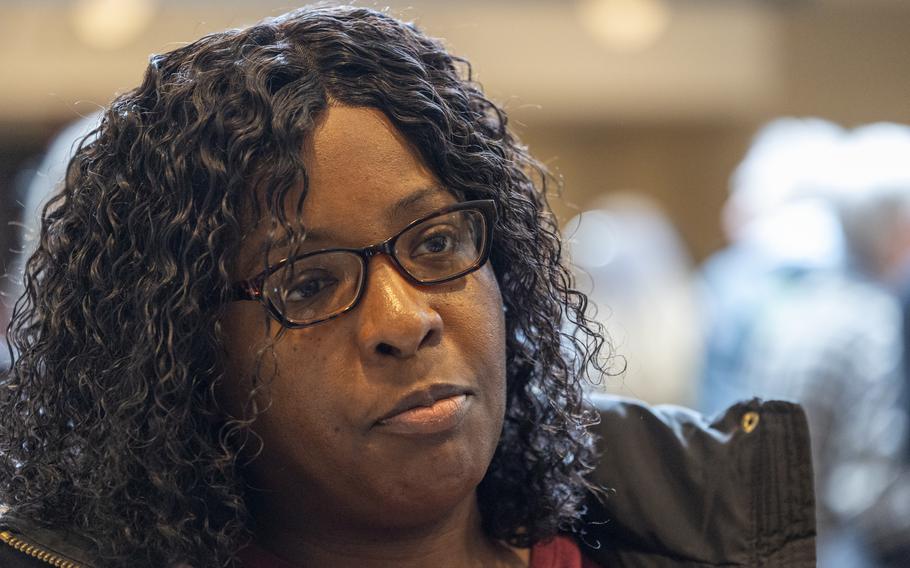
Faudeline Choute on Wednesday, Jan. 8, 2025, before visiting the casket of former President Jimmy Carter, lying in state in the Capitol Rotunda in Washington. (Eric Kayne/Stars and Stripes)
Choute said she was drawn to the viewing because of Carter’s humanitarian work.
After leaving the Oval Office, Carter built thousands of homes with the charity Habitat for Humanity, monitored elections around the world, fought to eradicate diseases and advocated for human rights.
In 2002, Carter was awarded the Nobel Peace Prize for his post-presidency work.
“I’m here because of his character and what he stood for,” Choute said. “I just appreciate his humanity, empathy for others and his graciousness.”
Carter will be buried alongside his wife in Georgia, where the Navy on Thursday will conduct a ceremonial flyover as a final salute to his service in the military and as commander in chief.
Steve Wilborn, 69, is not a veteran, but he said he would salute Carter’s casket when he stood in front of it.
“I’m not military, but I’ll salute him because he was our commander in chief,” he said.
Wilborn took a two-hour train ride from Richmond, Va., for the viewing because he considered Carter a great humanitarian and a great Christian.
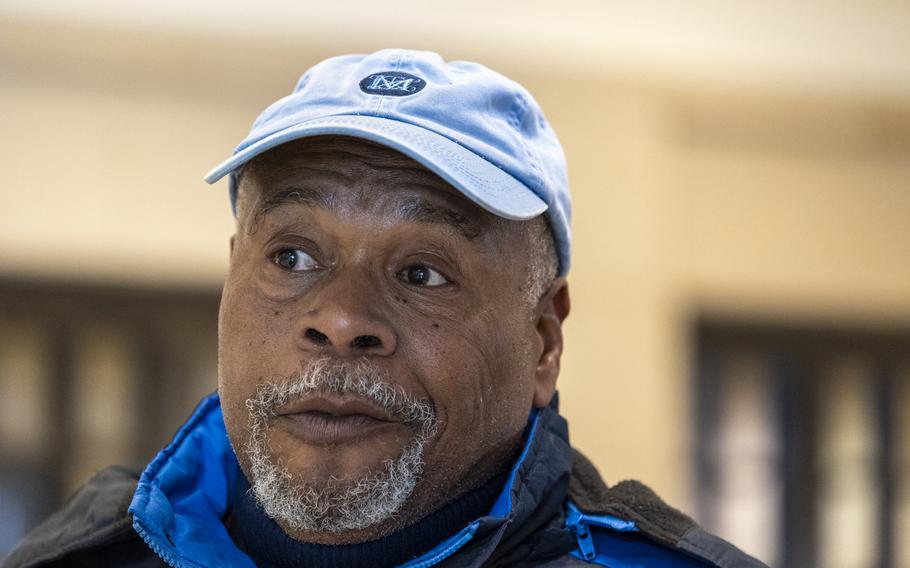
Steve Wilborn on Wednesday, Jan. 8, 2025, before visiting the casket of former President Jimmy Carter, lying in state in the Capitol Rotunda in Washington. (Eric Kayne/Stars and Stripes)
He voted for an independent, John Anderson, when Carter unsuccessfully ran for a second term in 1980 but came to admire Carter’s character and commitment to making the world a better place.
“To me, it all came together after his tenure ended in the White House,” he said. “He used all the talents he had from a young man — his military service and service beyond that is unmeasurable so I had to come and honor him.”
Wilborn said he took special pride in his great niece’s service in the Navy knowing Carter had served in the same military branch.
“The man had a brilliant mind, and I’m just so proud of him,” he said. “Just to be in the presence of his casket is an honor for me.”